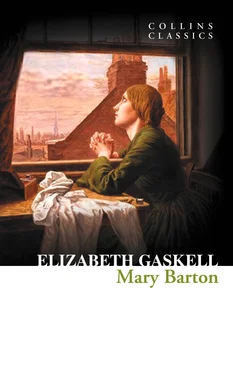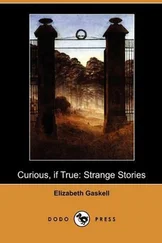MARY BARTON
Cover
Title Page MARY BARTON
Preface
Chapter 1: A Mysterious Disappearance
Chapter 2: A Manchester Tea-Party
Chapter 3: John Barton’s Great Trouble
Chapter 4: Old Alice’s History
Chapter 5: The Mill on Fire – Jem Wilson to the Rescue
Chapter 6: Poverty and Death
Chapter 7: Jem Wilson’s Repulse
Chapter 8: Margaret’s Début as a Public Singer
Chapter 9: Barton’s London Experiences
Chapter 10: Return of the Prodigal
Chapter 11: Mr Carson’s Intentions Revealed
Chapter 12: Old Alice’s Bairn
Chapter 13: A Traveller’s Tales
Chapter 14: Jem’s Interview with Poor Esther
Chapter 15: A Violent Meeting between the Rivals
Chapter 16: Meeting Between Masters and Workmen
Chapter 17: Barton’s Night Errand
Chapter 18: Murder
Chapter 19: Jem Wilson Arrested on Suspicion
Chapter 20: Mary’s Dream – and the Awakening
Chapter 21: Esther’s Motive in Seeking Mary
Chapter 22: Mary’s Efforts to Prove an Alibi
Chapter 23: The Sub-Pœna
Chapter 24: With the Dying
Chapter 25: Mrs Wilson’s Determination
Chapter 26: The Journey to Liverpool
Chapter 27: In the Liverpool Docks
Chapter 28: ‘John Cropper’, Ahoy!
Chapter 29: A True Bill against Jem
Chapter 30: Job Legh’s Deception
Chapter 31: How Mary Passed the Night
Chapter 32: The Trial and Verdict – ‘Not Guilty!’
Chapter 33: Requiescat in Pace
Chapter 34: The Return Home
Chapter 35: ‘Forgive us our Trespasses’
Chapter 36: Jem’s Interview with Mr Duncombe
Chapter 37: Details Connected with the Murder
Chapter 38: Conclusion
Classic Literature: Words and Phrases Adapted from the Collins English Dictionary
About the Author
History of Collins
Copyright
About the Publisher
Three years ago I became anxious (from circumstances that need not be more fully alluded to) to employ myself in writing a work of fiction. Living in Manchester, but with a deep relish and fond admiration for the country, my first thought was to find a frame-work for my story in some rural scene; and I had already made a little progress in a tale, the period of which was more than a century ago, and the place on the borders of Yorkshire, when I bethought me how deep might be the romance in the lives of some of those who elbowed me daily in the busy streets of the town in which I resided. I had always felt a deep sympathy with the care-worn men, who looked as if doomed to struggle through their lives in strange alternations between work and want; tossed to and fro by circumstances, apparently in even a greater degree than other men. A little manifestation of this sympathy, and a little attention to the expression of feelings on the part of some of the work-people with whom I was acquainted, had laid open to me the hearts of one or two of the more thoughtful among them; I saw that they were sore and irritable against the rich, the even tenor of whose seemingly happy lives appeared to increase the anguish caused by the lottery-like nature of their own. Whether the bitter complaints made by them of the neglect which they experienced from the prosperous – especially from the masters whose fortunes they had helped to build up – were well-founded or no, it is not for me to judge. It is enough to say, that this belief of the injustice and unkindness which they endure from their fellow-creatures taints what might be resignation to God’s will, and turns it to revenge in many of the poor uneducated factory-workers of Manchester.
The more I reflected on this unhappy state of things between those so bound to each other by common interests, as the employers and the employed must ever be, the more anxious I became to give some utterance to the agony which, from time to time, convulses this dumb people; the agony of suffering without the sympathy of the happy, or of erroneously believing that such is the case. If it be an error that the woes, which come with ever returning tide-like flood to overwhelm the workmen in our manufacturing towns, pass unregarded by all but the sufferers, it is at any rate an error so bitter in its consequences to all parties, that whatever public effort can do in the way of merciful deeds, or helpless love in the way of ‘widow’s mites’ could do, should be done, and that speedily, to disabuse the work-people of so miserable a misapprehension. At present they seem to me to be left in a state, wherein lamentations and tears are thrown aside as useless, but in which the lips are compressed for curses, and the hands clenched and ready to smite.
I know nothing of Political Economy, or the theories of trade. I have tried to write truthfully; and if my accounts agree or clash with any system, the agreement or disagreement is unintentional.
To myself the idea which I have formed of the state of feeling among too many of the factory-people in Manchester, and which I endeavoured to represent in this tale (completed above a year ago), has received some confirmation from the events which have so recently occurred among a similar class on the Continent.
October, 1848
A Mysterious Disappearance
‘Oh! ’tis hard, ’tis hard to be working
The whole of the live-long day,
When all the neighbours about one
Are off to their jaunts and play.
There’s Richard he carries his baby,
And Mary takes little Jane,
And lovingly they’ll be wandering
Through field and briery lane.’
MANCHESTER SONG
There are some fields near Manchester, well known to the inhabitants as ‘Green Heys Fields’, through which runs a public footpath to a little village about two miles distant. In spite of these fields being flat, and low, nay, in spite of the want of wood (the great and usual recommendation of level tracts of land), there is a charm about them which strikes even the inhabitant of a mountainous district, who sees and feels the effect of contrast in these commonplace but thoroughly rural fields, with the busy, bustling manufacturing town he left but half-an-hour ago. Here and there an old black and white farmhouse, with its rambling out-buildings, speaks of other times and other occupations than those which now absorb the population of the neighbourhood. Here in their seasons may be seen the country business of haymaking, ploughing, &c., which are such pleasant mysteries for townspeople to watch: and here the artisan, deafened with noise of tongues and engines, may come to listen awhile to the delicious sounds of rural life: the lowing of cattle, the milkmaid’s call, the clatter and cackle of poultry in the old farmyards. You cannot wonder, then, that these fields are popular places of resort at every holiday time; and you would not wonder, if you could see, or I properly describe, the charm of one particular stile, that it should be, on such occasions, a crowded halting-place. Close by it is a deep, clear pond, reflecting in its dark green depths the shadowy trees that bend over it to exclude the sun. The only place where its banks are shelving is on the side next to a rambling farmyard, belonging to one of those old world, gabled, black and white houses I named above, overlooking the field through which the public footpath leads. The porch of this farmhouse is covered by a rose-tree; and the little garden surrounding it is crowded with a medley of old-fashioned herbs and flowers, planted long ago, when the garden was the only druggist’s shop within reach, and allowed to grow in scrambling and wild luxuriance – roses, lavender, sage, balm (for tea), rosemary, pinks and wallflowers, onions and jessamine, in most republican and indiscriminate order. This farmhouse and garden are within a hundred yards of the stile of which I spoke, leading from the large pasture field into a smaller one, divided by a hedge of hawthorn and blackthorn; and near this stile, on the further side, there runs a tale that primroses may often be found, and occasionally the blue sweet violet on the grassy hedge bank.
Читать дальше












